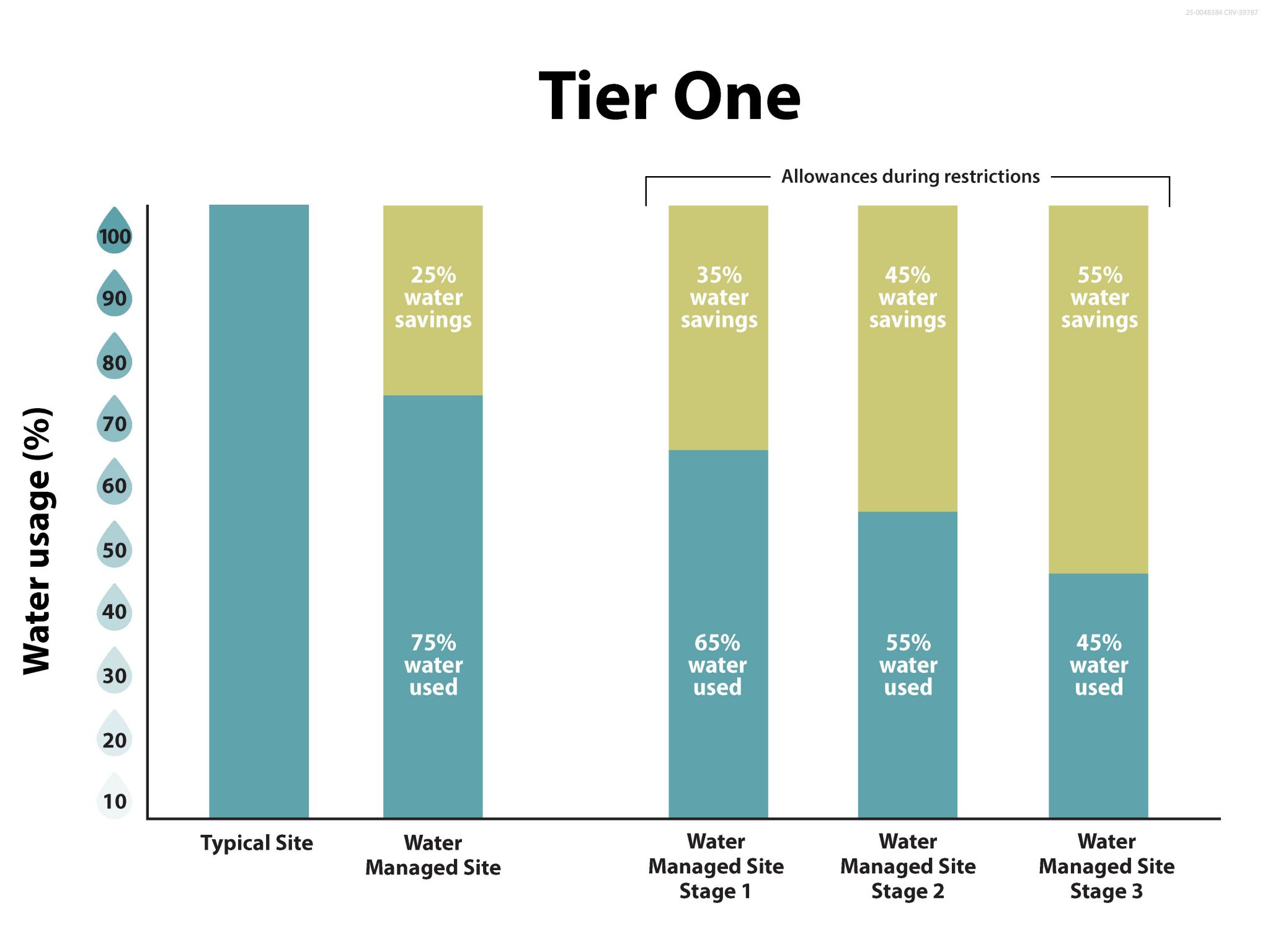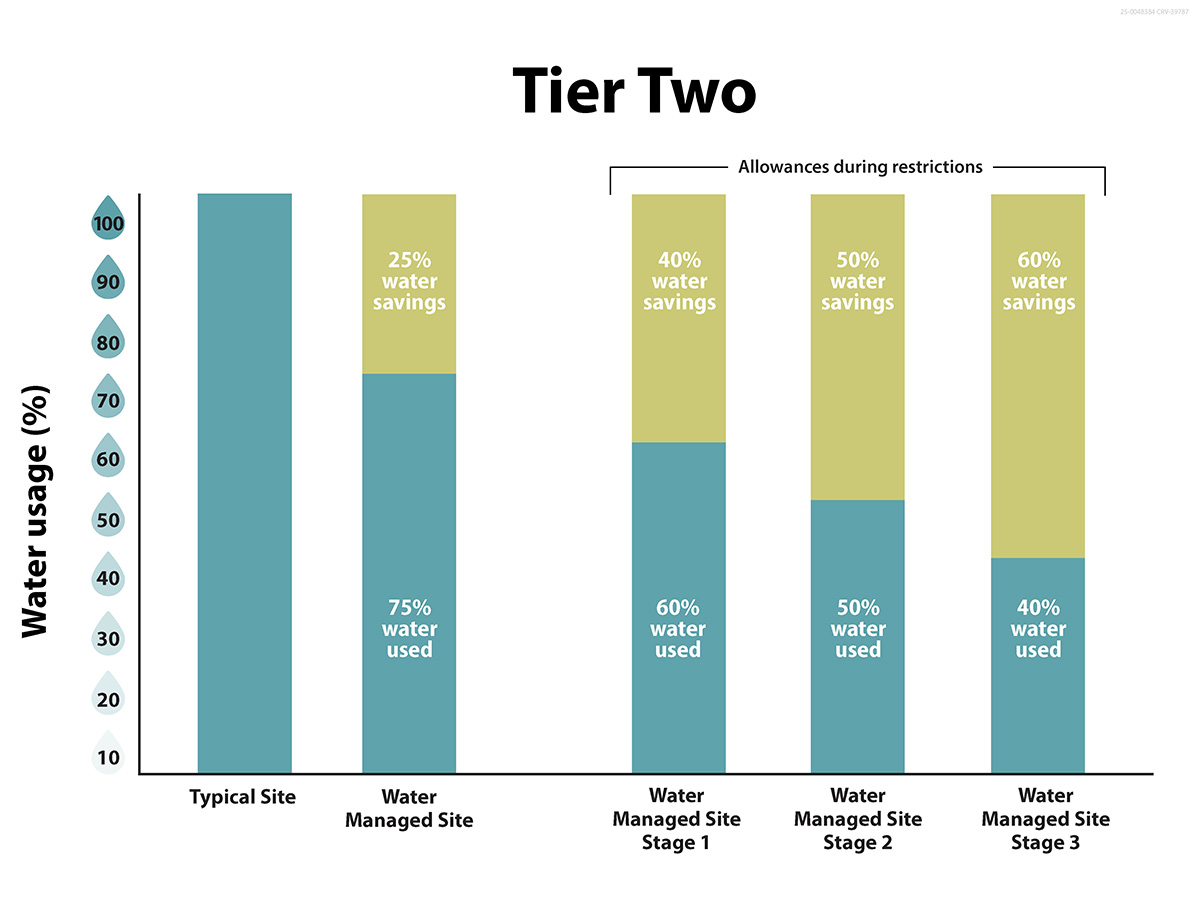Water Managed Sites
The Water Managed Sites program is designed to ensure water is provided to landscapes that need it, as long as the irrigation system is used as efficiently as possible, each and every day during the irrigation season.
Water Managed Site certification indicates that the irrigation system present is water efficient and can respond to weather and/or soil moisture conditions at the site and apply the appropriate amount of water (no more, no less) to the landscape to keep it healthy, while avoiding water wastage.
For certification, Water Managed Sites are required to reduce their water use by 25 per cent each year, compared to baseline operation of that site’s irrigation system in that year.
In recognition of the 25 per cent reduction in water usage throughout the season, Water Managed Sites can continue watering (with relaxed watering reductions) during outdoor watering restriction Stages 1 through 3, as per Schedule E of the Water Utility Bylaw.
Water Managed Site certification is available for both residential and commercial sites.
Benefits of Water Managed Site certification
Additionally, Water Managed Site certification is a great way to demonstrate that you value the natural assets you are responsible for and understand the importance careful water management plays in ensuring water is available for all of our needs.
Requirements for Water Managed Site certification
Irrigation system with sensors
For Water Managed Site certification, your property must have an automatic irrigation system that uses weather data and/or on-site environmental sensors to control watering schedules.
Annual performance report
To maintain Water Managed Site certification, an annual performance report must be submitted to The City that provides evidence that water use was reduced by 25 per cent that year over the baseline of an irrigation timer scheduled to water three days a week.
System details are captured in an initial water audit (Tier 1 sites) or an irrigation site assessment (Tier 2 sites) conducted by a Certified Landscape Irrigation Auditor.
Annual cross connection control testing
Certified Water Managed Sites must have checks in place to ensure the safety of the water delivery system (e.g. Cross connection control device) and measure use to prove performance efficiency (e.g. irrigation meter or totalizer).
Water Managed Site certification process
Step 1: Site equipment verification
Ensure you have the equipment installed and operating on your site that meet the criteria for certification, including:
- A smart controller with remote operability and real-time weather data capabilities
- A weather station or a rain sensor or a moisture sensor
- A leak/flow sensor
- An electronically controlled irrigation master valve
- A recently inspected and approved Cross Connection Control Device (RP/DCVA)
- A billing meter (Tier 1 sites only)
- A volume totalizer (Tier 2 sites only)
Step 2: Book a Certified Landscape Irrigation Auditor
Contact a Landscape Irrigation Auditor that is certified by the Irrigation Association. A list of local certified auditors can be found on the Irrigation Association - Certification Directory.
Your Certified Landscape Irrigation Auditor must maintain their certification status. Certified Landscape Irrigation Auditors who do not maintain their certification or knowingly falsifies information in applications, audits, irrigation system assessments or performance reports will be removed from The City’s list of approved Certified Landscape Irrigation Auditors.
Step 3: Certification application
Your Certified Landscape Irrigation Auditor will visit your property to conduct an inspection of your system. Your auditor must complete the certification application form and send it to watermanagedsites@calgary.ca on your behalf.
For your application, your auditor will help you determine which Tier is best for your site:
- Tier 1 sites are typically parks, playgrounds, sports fields or large green spaces.
- Tier 2 sites are commonly single-family residential yards or small ICI spaces.
You will receive confirmation of your application status within 10 working days. Until then, your irrigation system must continue to operate normally and must follow all watering schedules or outdoor water restrictions enforced through the Water Utility Bylaw.
Immediately upon certification, your site will be added to The City’s internal list of certified sites to ensure Community Peace Officers have the latest information.
If your site is not approved for certification, you will be notified. Prior to re-applying for certification, you must follow the recommendations provided. The City will receive new applications for the WMS from March 1 up to September 30 each year.
Step 4: Irrigation System Audit/Assessment
After you receive a letter of approval for the program, your Certified Landscape Irrigation Auditor must conduct and submit either a Catch Can Audit or an Irrigation System Assessment (ISA) during the irrigation season.
- Tier 1 sites require a Catch Can Audit
- Tier 2 sites require an Irrigation System Assessment
Step 5: Fall reporting requirements
A Site Performance Report must be submitted by your Certified Landscape Irrigation Auditor at the end of each irrigation season. This report must be submitted by November 30 each year.
Step 6: Spring reporting requirements
To continue participating in the Water Managed Sites program, your Certified Landscape Irrigation Auditor must complete and submit a Start up Notification prior to start up each spring. The notification template will be provided prior to spring 2026.
Choosing between Tier 1 and Tier 2 certification
During outdoor water restrictions Stages 1 through 3, both Tier 1 and Tier 2 sites benefit by being able to continue using the water efficient irrigation system on a reduced watering program.
How much a watering program must be reduced by varies depending on the Tier the site is certified for and the stage of outdoor water restrictions in effect:
In Stage 4 outdoor water restrictions, however, outdoor watering of any kind is not allowed, regardless of certification status. For more information, see "Schedule E" of the Water Utility Bylaw 40M2006.
During the certification process, your Certified Landscape Irrigation Auditor will help you determine which Tier is best for your site.
Tier 1 sites
- Catch Can Audit required for certification.
- Typical Tier 1 sites:
- Parks
- Playgrounds
- Sports fields
- Large green spaces
Tier 2 sites
- Irrigation Site Assessment required for certification.
- Typical Tier 2 sites:
- Single-family residential yards
- Small industrial, commercial or institutional (ICI) spaces.
Frequently asked questions
Why does The City of Calgary have a Water Managed Sites program?
The Water Managed Sites program was developed to address the unique watering needs of various landscapes as well as the efficacy of water efficient irrigation systems during times of outdoor water restrictions.
Not all landscapes are the same
Parks, sport fields, gardens, green space and residential yards are all very different landscapes and each have different water requirements to ensure they remain healthy.
Examples:
- Non-functional grass (e.g. grass most often only walked on by the owner when it is being mowed) does not require the same amount of water as grass which is used for recreational activities.
- Gardens and trees require regular watering or precipitation to remain healthy, unlike lawns which simply go dormant when insufficient water is provided.
Responsible use of water efficient irrigation systems
This program was also developed in recognition that watering restrictions required in the Water Utility Bylaw can deem some irrigation systems practically useless for keeping vegetation healthy.
Irrigation systems can often be found in large, high use green spaces like parks and recreation fields.
Restricting irrigation to these spaces to 1 to 2 hours per week effectively means those systems cannot run long enough to cycle through each zone. However, as Water Managed Sites have already proven to have water efficient irrigation, they are permitted to water (at reduced rates) as required during Stage 1 through 3 outdoor water restrictions.
How will my property be identified as a Water Managed Site?
All certified Water Managed Sites will receive a letter from The City identifying their property as a registered Water Managed Site.
The City maintains a list of certified Water Managed Sites for Community Peace Officers to reference.
Does a Water Managed Site ever have to be re-certified?
All certified Water Managed Sites must have a Certified Landscape Irrigation Auditor submit a performance report on their behalf at the end of each irrigation season. If the site meets the criteria of a minimum of 25 per cent water savings that year, the site may be re-certified for the following irrigation season.
When outdoor water restrictions are enacted during the irrigation season, Water Managed Sites must further reduce their water use during each stage as per "Schedule E" in the Water Utility Bylaw.
At a Stage 4 water restriction, all Water Managed Sites must stop operating their irrigation systems.
How can I save water if I don’t have an automatic irrigation system?
You can still help conserve water and have a beautiful yard by using these outdoor water conservation tips and tools.
When was the Water Managed Sites Program was created?
The City prioritizes balancing the need to reduce water demand with the protection of natural assets and public recreation, health and safety.
In recognition of how important our City’s outdoor recreation spaces and parks are to Calgarians, we developed the Water Managed Sites program in 2006. The program was designed specifically for The City’s Recreation and Parks business units to ensure City parks and outdoor recreation assets have the water needed to remain healthy even during outdoor water restrictions.
The program was designed to ensure water is provided to landscapes that need it, as long as the irrigation system is used as efficiently as possible, each and every day during the irrigation season. When outdoor water restrictions are in place, participating irrigation systems can continue watering, with some further reductions in water usage.
In 2024, the program was expanded to include commercial and residential customers that wish to participate.




